- Home
- Juliet Marillier
The Caller Page 8
The Caller Read online
Page 8
Perhaps he was foolish to hope for a message. None of the Good Folk would approach Winterfort, since the place was full of iron. Even when Stag Troop was out on patrol, uncanny folk would not come close, for the nature of the work meant everyone went heavily armed. He gave them opportunity when he could, walking out into the woods on his own with his weapons rolled into his cloak, but even then there was nothing. Yet Sage had approached him twice in the past when he was bearing knives.
The onset of winter made it unlikely Tali would use human messengers. It was a long way from Shadowfell to Winterfort, with a mountain pass to cross. Too far in the cold season, even if Tali had a chain of reliable folk all the way. Too risky, unless the matter was of utmost importance. And if messengers did not come to him, he could not send word back again. The rebels did not know about Esten. He could not warn them; Neryn could not prepare. Esten’s presence would turn next midsummer’s confrontation into disaster. It was the difference between an unlikely but possible victory and certain defeat. Worse than defeat. Annihilation. They’d all be done for: brave Tali, his beloved Neryn, the band of rebels who had shaped his destiny since he was little more than a boy, the chieftains who had pledged to stand up beside Tali’s rebel army and the men who followed them. And the Good Folk; those whom Neryn would call to fight alongside them. They, too, would be destroyed, perhaps by their own kind. It was unthinkable.
He knew what Tali would want. She’d expect him to kill Esten, despite the risk that he would be discovered. A straightforward assassination: a task well within his capabilities, if not for one thing. Brydian, too, had a canny gift, a highly unusual gift not known to many. He could throw a cloak of protection over a person, an unseen armour that no physical attack could penetrate. He used it to shield the king during his public appearances – for instance, at the Gathering.
Now Brydian was staying very close to the Caller, and Flint suspected he was under orders to keep Esten protected at all times. Unless and until Brydian let Esten go far enough from him to render the charm ineffective – the councillor’s gift did not work over a long distance – there would be no quick and covert despatch of the Caller.
He could account for Brydian first and then kill Esten, of course, but he was unlikely to get away with that, and the repercussions would be dire. Tali would expect him to sacrifice his own life for the good of the cause; it was part of the rebel code. But he’d need to be quite certain of his ability to stay silent under torture, or his will to use the packet of hemlock seeds they all carried for such an extreme. No point in this double murder if he then betrayed the tightly held secret of the planned rebellion. So. First Brydian, then Esten, then himself. He’d need to be constantly alert, ready to seize the opportunity. As for dying without seeing Neryn again, he could not let himself think of that.
He was in the stables, grooming Lightning. One or two other men were about, engaged in the same task – many horses were kept here. There were stable hands to do the job, but most of the Stag Troop men preferred to tend to their own mounts. It strengthened the bond; helped rider and horse to work as a team. The steady movement of the brush, the warmth of Lightning’s presence close to him, the relative quiet of the stables helped calm his racing thoughts. And if, even here, someone was watching him, ready to report back to Varda – perhaps that boy over there oiling harness, or the fellow from Seal Troop on the far side working on his horse’s hoofs – he would, for a little while, pretend it was not so. He would allow himself to remember last summer, and the night he and Neryn had spent lying chastely in each other’s arms, alone in a cottage with the sound of the murmuring sea beyond the shutters. His last night of peace. Her hair soft against his naked skin; her hands touching him with such tenderness. That night, he had glimpsed a future that now seemed an impossible dream.
The king had made Esten demonstrate his skill before all of them. The Caller had conjured three of the smaller Good Folk out of nothing, or so it had seemed; he had, perhaps, called them forth from somewhere in the wooded hills around Winterfort, but the three of them had not walked in through the fortress gates. They had simply appeared beside Esten, looking bewildered. Two were human-like in form; the third had a long snout, big eyes and a soft coat of dark fur. Under the wild applause of the assembled onlookers, the three had shrunk back. The furred one had screamed when the king approached to prod and examine them. Keldec had been wearing a knife at his belt. Even sheathed, it would have hurt them.
Nobody had attempted to engage the small ones in conversation. Instead, the queen had asked her Caller if he could make them dance; if he could make them fight; if he could make one of them attack an Enforcer. The resulting spectacle had been . . . He could not find the right word for it. He only knew it would have brought bitter rage to Neryn’s heart if she had seen it. He’d wanted to step in, to stop it. Instead he had stood there watching like all the others, with his jaw clenched tight over a torrent of furious words. Others, too, had found the spectacle offensive; he had seen it on their faces. But nobody had spoken out.
The three small folk had survived their ordeal, though two had been injured. Now they were locked into one of the punishment cells, with an iron chain on the door to prevent their escape. Wolf Troop had the job of guarding prisoners. The special captives had been in custody awhile. The word was, the queen went to visit them every day, with Brydian and Esten. It entertained her to toy with the small folk. All three were weakening. How could he endure this until midsummer? The days were all edgy pretence, the nights a torment of agitated wakefulness or, worse, darkly violent dreams. How had he managed to be what he was, to do what he had to do, for all these years? How had he shut down his conscience for so long?
In the past, he’d been a master of shielding what he felt. Since that day at Wedderburn, when he had so nearly escaped this travesty of a life, it had become ever harder to maintain his detached look. Now he saw a question in his comrades’ eyes as they glanced at him. Whether it was because the king had ordered him to prove his loyalty at the Gathering, or whether it was the delay in returning to court after the trip to Wedderburn – only a short delay, thanks to Rohan’s intervention, but noticed all the same – he felt he was under scrutiny even by the men of his own troop. Midsummer seemed a long time away. And yet, it would come all too quickly.
‘Owen?’ Rohan was right beside him, arms folded. ‘The king wants you. Now, in the small council chamber.’
‘Any idea why?’
His second-in-command shook his head. ‘Here, give me those.’ Rohan took the horse brush and the rough cloth. ‘You’d better get cleaned up before you present yourself.’
They looked at each other. Many times, Flint had been a hair’s breadth from confiding in Rohan, whom he increasingly believed had more than an inkling that his troop leader was living a double life. But he had never risked it. If he was wrong, taking such a step would not only ensure his own death, it could bring down the entire rebel movement. If he was right, of course, then he had a valuable ally, someone who was prepared to live the lie with him rather than see him destroyed. It had been Rohan who had suggested Flint go alone to the isles, and thereby helped him save his old mentor. It had been Rohan who’d helped him rescue Tali and Neryn at the Gathering and not asked a single question afterwards. It had been Rohan who’d come for him when he was on the verge of quitting the king’s service. Each time, Flint became more convinced that these were his comrade’s own choices, not those of a king’s lackey trying to trick him into betraying himself. Still, he would not speak openly.
‘Go on, then,’ Rohan said.
The small council chamber had two guards on the door, men from Wolf Troop. Inside, there was only Keldec. The king was seated at an oak table, frowning at a manuscript spread out before him. A map, the south of Alban from coast to coast, done in meticulous detail. Flint could see rivers, islands, mountain ranges, a fortification with a banner atop its tower, a lake in which a grotesque sea monst
er swam. Keldec was tracing a path with a dry quill. He appeared to be deep in thought.
Flint came to a halt a few steps from the table and stood waiting in silence. The king ignored him. Well, two could play at that game. He stood breathing slowly, hoping to be ready for whatever Keldec might have to say to him. The silence drew out.
Finally, ‘Of what use is a Caller, Owen?’ the king asked. ‘You’ve seen those fey folk, how puny and helpless they are. Touch them with the smallest knife or bracelet or buckle and their flesh swells and weeps as if burned. I thought my Caller would bring me warriors. Instead, he brought toys. Living poppets for the entertainment of women and children. And yet, in the old tales, Callers are instrumental in changing the course of battles. Callers aid in the conquest of new territories. They enable leaders to wield enormous power. So Brydian tells me. Esten . . . I see the fellow’s potential, of course. But his reach seems quite limited. I had hoped for better things, far better.’
‘I’m sorry, my lord King.’
‘Sorry? You’re sorry?’ Keldec cast aside the quill and jumped up to stride over to a narrow window, where he set his hands against the wall on either side and stared out toward the east. Winterfort stood on a hill; a fortress wall encircled that hill, and below it a substantial settlement had grown up. ‘In what way is this your fault, Owen? I am musing, only musing.’ The king’s shoulders were tight. ‘When word came to me that a Caller had been found, my mind leaped to what we might do, what we might achieve with such a tool in our hands. We might build an army such as nobody in all Alban possessed; we might create a force capable of wiping out any opposition, however handsomely equipped, however expertly drilled. What I see now is an army of little folk, an army of squirrels and martens and children who will shriek and collapse if they see so much as a paring knife. I have not reprimanded Esten. The queen believes he will learn to do greater things. I am not sure how she can know that. To tell you the truth, old friend, I am somewhat disappointed.’
At least the disappointment, this time, was not with Flint himself. Unless he was missing something. Keldec was fond of springing surprises. ‘Yes, my lord King.’
‘Are there not grander folk, stronger folk, giants, trolls, brollachans and the like, whom a Caller might summon? Creatures that can fight?’
‘My lord King, I am no expert on such matters, but I believe folk of that kind are mentioned in the ancient stories. Brydian and the other councillors would be better able to advise you.’
‘I’m not asking Brydian. I’m asking you.’ Keldec turned, half-seating himself on the stone ledge below the window. Cold winter light spilled in around him, but his face was in shadow. ‘I need a battle leader’s advice, Owen, not a scholar’s. If you were in my position, how would you turn a Caller into a strategic advantage? How would you ensure he was up to the job? Is it even possible to build an uncanny army of the kind I hope for?’
He longed to answer no, it was not and never would be. He longed to say that the king might as well abandon his plans to use Esten in such a way. Unfortunately, while Keldec himself might swallow that argument, Varda and Brydian would not. Keldec was a straightforward thinker. His wife was clever and unscrupulous, her councillor learned in lore and unswervingly loyal to her.
‘My lord King,’ he said, ‘it’s my understanding, from my limited knowledge of the lore, that a Caller can draw human and uncanny forces together against a common enemy. I imagine that if more powerful beings such as those you mentioned – brollachans and the like – still exist in Alban, they might be summoned and commanded to fight alongside, say, your troops of Enforcers. The men would find it . . . challenging. The Caller would need to exercise a great deal of control. I would imagine such a person would need to spend time learning military strategy beforehand.’
‘We could do it, then.’ Keldec’s eyes had brightened; there was a new note in his voice. ‘I was right, this is possible after all.’
Flint’s heart sank. ‘These small folk will never be warriors, my lord king. But yes, it might be possible with stronger beings. It would be a huge undertaking to find such beings and persuade them to cooperate.’
‘But a Caller removes the need for persuasion, Owen. We need only find these folk and bring them here.’
‘Yes, my lord King.’ Flint chose his words with particular care. ‘A grand endeavour indeed. The bigger folk may be in distant parts of Alban. Hidden deep. It could be the work of years.’
‘We must see what Esten can do. An expedition . . .’
Briefly, Flint let himself imagine Esten taken somewhere far away, hunting for elusive Good Folk; Esten gone from court until after midsummer. Too good to be true, he feared. ‘Yes, my lord King.’
‘As for the three we have in custody, my wife is tired of them. They no longer provide her with good entertainment.’
‘Will you cull them, my lord?’ He kept his tone calm.
‘The queen has suggested a course of action for their disposal. It involves you.’
A test of his loyalty, no doubt; he waited for Keldec to order him down to the Hole to make an end of the three little folk. One of these days he would reach breaking point. One of these days he would refuse a direct order.
‘We wish to send a clear message to all uncanny folk that our authority stretches over them as well as our human subjects; that we can do as we wish with them, and that if they fail to satisfy our needs there will be dire consequences. So yes, they will be culled, but not here at Winterfort. On their own home ground. Brydian is of the opinion that these are folk of the forest. I want them taken out there, at a time when others of their kind may be close by, and executed. You will remove them from the cells at an appropriate time, convey them to a suitable spot and carry out the culling.’
Flint worked on keeping his expression bland. ‘On my own, my lord King?’
‘What, frightened of three small folk no higher than your knee?’ There was a twinkle in the king’s eye. ‘My redoubtable Stag Troop leader?’
‘Frightened, no, my lord. Surprised, yes. I will do it, of course.’
‘You wonder why this is a job for one man, and why I allocate it to such a senior Enforcer? Brydian believes that if several men go out, the other Good Folk are less likely to come close and witness what occurs. He also said your wisdom and experience will allow you to choose the right spot.’
Wisdom and experience. That, from Brydian? This was some kind of trap. At the very least, a test of his loyalty. ‘I see, my lord King.’
‘It’s been suggested you might take them out at dusk, around supper time. I concur with that. Let us not make a performance of this.’
So Keldec did not want his household to witness what had, in fact, been a dismal failure. ‘Yes, my lord King.’
‘Do it today, Owen. Brydian tells me the captives will not last much longer, and we don’t want fate stealing our chance to make an example of them.’
Not long before dusk, he went down to Winterfort’s place of incarceration. The Hole – an unofficial name, but one that had stuck – lay between the outer and inner walls of the fortress. The cells were small; the place was dark. There was a lamp at the guard post, and here and there a fist-sized opening had been pierced through the outer wall, as if to tantalise the inmates with faint hope. Without the air these chinks admitted, prisoners would have succumbed too soon for useful questioning. The Hole was shadowy, damp, noxious. A man might die there of the stench, the biting insects, the watery grey substance that passed for food. Or he might perish from sheer despair before the king took any interest in him.
Before he reached the top of the narrow stairs that led down to the cells, he heard the screaming, a high, thready, exhausted sound. He descended, breathing slowly, allowing the practised mask of calm to spread across his features.
Brocc from Wolf Troop, one of the enthralled men, was at the guard post. He saluted – right arm across breast, fis
t clenched – showing appropriate deference to Flint’s status as a troop leader.
‘Owen.’
‘Brocc. I’m here to take the small folk away.’
Brocc lowered his voice, making it hard to catch his words above the sound from the cells. The crying was underscored, now, by a rhythmic rattling and thumping sound. ‘I was expecting you. Got the orders earlier. But . . .’
‘But what?’
Brocc frowned. ‘The queen came down. She’s in there now with the prisoners. Said she wanted some time with them before you took them out.’
‘How much time?’ There wasn’t long left, from the sound of things. ‘I need to get them out before the light goes.’
‘She hasn’t been there long.’ Brocc was edgy, torn between the king’s orders and the physical presence of the queen in the nearby cell. ‘Owen, I can’t just walk in there and –’
An enthralled man was faultlessly loyal to the king. Brocc was therefore bound to obey the original orders. But only a man with very little imagination would dare slight the queen.
‘I’ll go in.’ Flint had already set aside his weaponry; it had not seemed appropriate to bring sword or knives close to these particular prisoners, even though Brocc had a sword, and there were iron bars on the cells. He drew a deep breath, walked along the narrow way between the two rows of cells, stopped before the barred opening to the one where the screaming was coming from. Had come from. Varda was there, a small, upright figure in her red gown, with her dark hair piled high and her features alight with perverse pleasure. She had an Enforcer in the cell with her, another of the Wolves. He was the one who had been administering punishment; the queen had most likely been giving orders.
‘Owen Swift-Sword.’ The queen’s voice was a little breathless. ‘Come to clear out our rubbish? Such promise, when Esten brought them in, and such a disappointment when we got to the real test . . . Never mind. No doubt there are plenty more where these came from. Come in, don’t stand on ceremony. We were just leaving.’ She brushed past him, her lips curving in a smile that did not reach her eyes. ‘I’m afraid you’re just too late for this ugly little thing. But at least it’s quiet now; my head was aching. Take them, Owen. That’s what the king ordered.’ The voice was hard metal coated in syrup; she made no secret of her dislike. ‘Ardon, find Owen Swift-Sword a bag in which to carry this . . . remnant.’ She strode out of the cell, leaving the grilled door open, and swept away toward the steps. Ardon asked a question with his eyes; Flint shook his head, and the Enforcer followed the queen. He had a heavy chain over his shoulder and an iron bar in his hand.

 Den of Wolves
Den of Wolves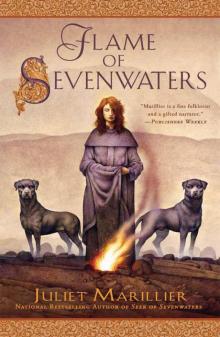 Flame of Sevenwaters
Flame of Sevenwaters Blade of Fortriu
Blade of Fortriu Wildwood Dancing
Wildwood Dancing Dreamer's Pool
Dreamer's Pool Raven Flight
Raven Flight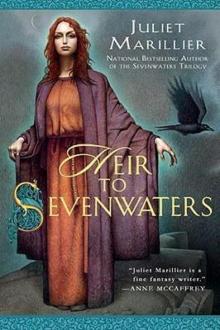 Heir to Sevenwaters
Heir to Sevenwaters The Dark Mirror
The Dark Mirror Daughter of the Forest
Daughter of the Forest Seer of Sevenwaters
Seer of Sevenwaters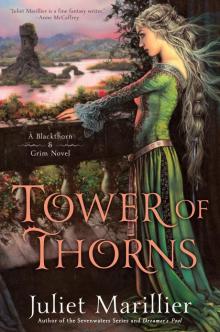 Tower of Thorns
Tower of Thorns Shadowfell
Shadowfell Wolfskin
Wolfskin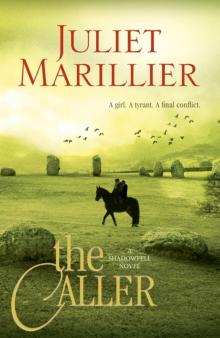 The Caller
The Caller Foxmask
Foxmask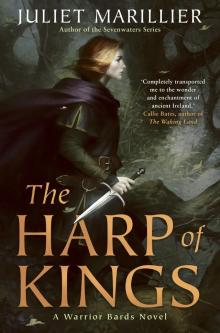 Harp of Kings
Harp of Kings The Well of Shades
The Well of Shades Heart's Blood
Heart's Blood Child of the Prophecy
Child of the Prophecy Twixt Firelight and Water
Twixt Firelight and Water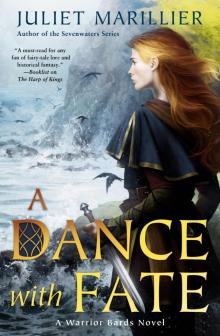 A Dance with Fate
A Dance with Fate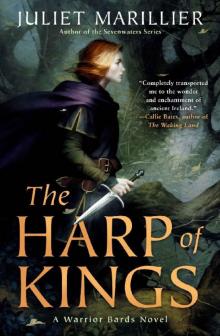 The Harp of Kings (Warrior Bards)
The Harp of Kings (Warrior Bards)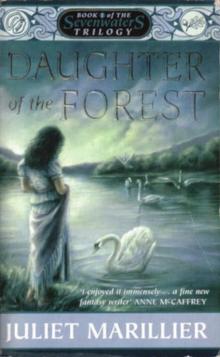 Daughter of the Forest (The Sevenwaters Trilogy)
Daughter of the Forest (The Sevenwaters Trilogy)![Sevenwaters [06] Flame of Sevenwaters Read online](http://i1.bookreadfree.com/i2/04/08/sevenwaters_06_flame_of_sevenwaters_preview.jpg) Sevenwaters [06] Flame of Sevenwaters
Sevenwaters [06] Flame of Sevenwaters![[Sevenwaters 04] Heir to Sevenwaters Read online](http://i1.bookreadfree.com/i2/04/12/sevenwaters_04_heir_to_sevenwaters_preview.jpg) [Sevenwaters 04] Heir to Sevenwaters
[Sevenwaters 04] Heir to Sevenwaters